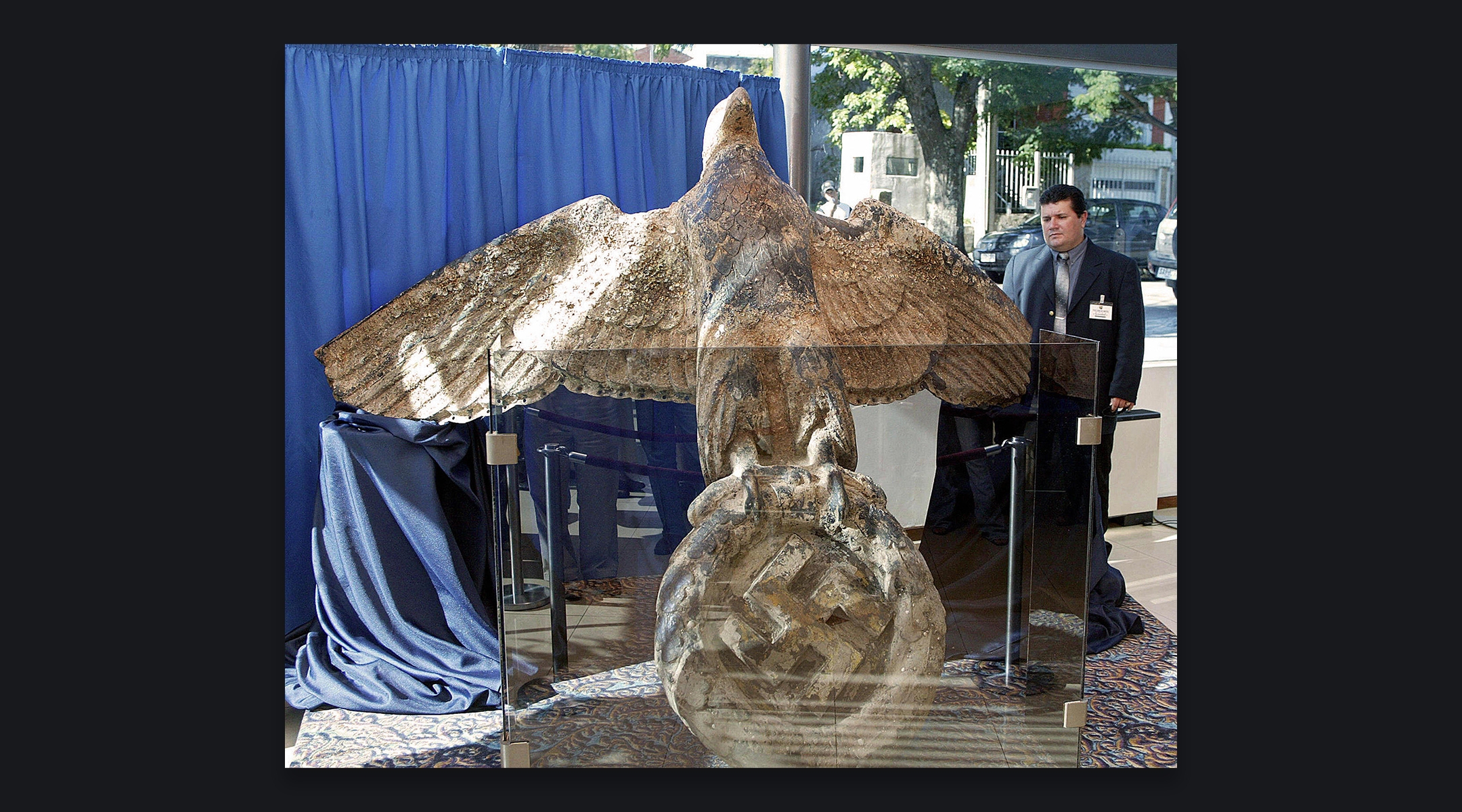Uruguay’s president scuttles plan to turn giant Nazi eagle into a peace dove after criticism
The plan would be like ‘transforming Auschwitz into a nude camp,’ one prominent Uruguayan argued

A security guard looks at the bronze eagle recovered from the stern of the German Graf Spee battleship, on display in Montevideo, Uruguay, Feb. 13, 2006. (Miguel Rojo/AFP via Getty Images)
(JTA) — Uruguay’s president has withdrawn a proposal to transform a swastika-emblazoned 800-pound bronze eagle from a sunken Nazi ship into an artistic display of peace, following criticism that the plan devalued history.
The question of what to do with the eagle, which sits in a naval warehouse, has vexed Uruguay since private explorers recovered it from the wreckage of the Admiral Graf Spee in 2006. The country briefly displayed it as a historical artifact but retracted the display after facing charges that it was glorifying Nazism.
In 2019, a Uruguayan court ruled that the government must auction the crest and give the proceeds to the investors who paid for the recovery mission. It was pulled off the auction block amid protests by Jewish groups and the German government; last year, a Jewish businessman offered to buy it and destroy it.
President Luis Lacalle Pou offered another idea on Friday: let the Uruguayan sculpture artist Pablo Atchugarry melt down the relic, refashioning the Nazi eagle into a dove of peace.
Local Jewish leaders initially applauded the presidential announcement. But soon voices emerged to criticize the plan.
Turning a Nazi artifact into a peace dove would be like if “Mexico turned its Aztec sacrificial stones into camping tables,” Uruguayan historian and humorist Diego Delgrossi argued. A former parliamentarian, Anibal Gloodtdofsky, likened it to “transforming Auschwitz into a nude camp.”
And the Uruguayan writer Mercedes Vigil tweeted in response to the government’s announcement, “If the cultural heritage of humanity followed these criteria, jewels like the Roman Circus, Cappadocia, the Wailing Wall and more, today would be scorched earth.”
On Sunday Uruguay’s president announced that he withdrew his decision. “If one wants to generate peace, the first thing to generate is unity. And that is what is not happening,” Lacalle Pou said in a press conference. “I still think it’s a good idea, but a president has to listen.”
The debate extended across the Rio de la Plata, the river separating Uruguay and Argentina, where there is a significant Jewish population and the region’s only Holocaust museum, which recently reopened after a three-year renovation.
“All ideas and artistic representations that raise awareness about the horror of Nazism are very valuable,” the Buenos Aires Holocaust Museum’s executive director, Jonathan Karzembaum, told the Jewish Telegraphic Agency on Monday. “However, it is not necessary to take an object or historical document for this, especially one as unique as the eagle on the Graf Spee, which links the history of the Third Reich with the Rio de la Plata river.”
Another Argentine proposed a different plan for the Nazi eagle.
“The eagle on the Graf Spee must not be adulterated or destroyed,” tweeted Carlos Maslaton, an attorney and political liberal with a large social media following. “On the contrary, it should be taken to Jerusalem, the capital of Israel, which is the country of the Jews, and exhibited in a special monument with the phrase: ´Failed Nazis, the operation went wrong. Zionism has won. Blow yourself up.’”
Uruguay is home to about 15,000 Jews, according to the Latin American Jewish Congress, out of a total population of 3.4 million. It was the first South American country to officially recognize the state of Israel and was home to the first Israeli embassy in Latin America, established in 1948.
Uruguay is far from alone in struggling with how to handle Nazi relics. Most auction houses eschew the items, in part out of fear that they may be purchased by Nazi sympathizers, though a few have made a business in the trade.
The Simon Wiesenthal Center issued a statement in 2021 urging Uruguay to display the crest in a museum instead of selling it to an open market. German officials have changed their initial anti-display posture, saying that they would allow the eagle’s display in an educational museum context. Lacalle Pou did not offer another plan after withdrawing the peace dove proposal.
This article originally appeared on JTA.org.

















